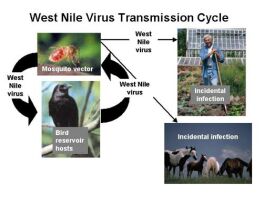By Tom Scheck
Minnesota Public Radio
August 29, 2002
The Minnesota Department of Health says the first two human cases of West Nile Virus have been discovered in the state. Officials say a 29-year-old Carver County man and a 35-year-old Hennepin County man have tested positive for the West Nile virus antibody. The mosquito-borne disease was first detected in animals in Minnesota last month. Health officials say they're not surprised by the first human cases and say it's possible additional human cases may be diagnosed this year.
| |
|
|
|
||
State epidemiologist Harry Hull says both men diagnosed with West Nile were hospitalized after reporting fevers that reached as high as 102 degrees, severe headaches and neck ache. He says both were hospitalized for three days and have been released. Neither man has encephalitis, the most severe form of West Nile virus.
West Nile encephalitis has killed 24 people this year. Hull says he's not surprised that someone has been diagnosed with West Nile since it was detected in both horses and birds in July.
The virus is transmitted by mosquitoes to humans, birds and horses. Humans cannot pass the virus to each other. Hull says in addition to the two human cases, 229 horses and 215 birds have been diagnosed with West Nile in Minnesota.
"The fact that it has been six weeks that the virus has been present in Minnesota. The fact that we have widespread isolation in horses and birds across the state and only now are we getting the first two human infections, I think, reinforces the fact that it's hard to get this disease," according to Hull.
Hull says the risk of contracting West Nile is low. He estimates that one in 150 people bitten by an infected mosquito develop severe enough complications to see a doctor. Nevertheless, West Nile has been causing problems for health officials nationwide since it was first detected in the United States in 1999.
The virus is now in 41 states and has killed 42 people since 1999. The most severely affected are the elderly and people with weak immune systems.
The Health Department's Dave Neitzel says Minnesota and other health departments nationwide are now trying to determine which mosquitoes are carrying the virus. He says it's possible that more people may be diagnosed with West Nile this year.
| |
|
|
|
||
"We would not be surprised to learn of more human cases over the next couple of weeks here. I think we're probably a little bit past peak in mosquito population and the risk should start to decline but people who were exposed over the last couple of weeks and should becoming ill fairly soon and seeing their doctors," he says.
Neitzel says the Health Department has been testing five to 15 human samples for West Nile every day since July and is pleased they've only detected two human cases so far.
The Metropolitan Mosquito Control District's Jim Stark says his agency will continue to monitor the mosquito population and may increase spraying if necessary.
"The first thing we're going to do is we're going to go out there and sample the adult mosquitoes and if we have elevated number of the mosquitoes that we're interested in we'll probably do some adult mosquito control. This really is a multi-pronged attack. Personal precaution is a very important part of this, public education is an important part of this, but mosquito control is a part of it too," said Stark.
While health officials say they're not surprised that they've detected human cases of West Nile, officials with the State Board of Animal Health say they're shocked at how many horses have been detected with the disease. Horses have been diagnosed with West Nile in 60 of Minnesota's 87 counties.
The board's Paul Anderson says he hopes a large number of horse owners will get their horses vaccinated against West Nile. There's a vaccine that can be given to prevent horses from getting West Nile but no known human vaccine.
"We expect West Nile will continue to be an issue year after year after year and as horse owners become more aware and they do a better job vaccinating the whole idea would be that they would have better protection for their animals," according to Anderson.
Health officials say people who are concerned about getting bitten by an infected mosquito can take certain precautions. They say people should wear mosquito repellant, long sleeves and avoid outdoor activities at dusk and dawn when mosquitoes are most active.
More from MPRMore Information


